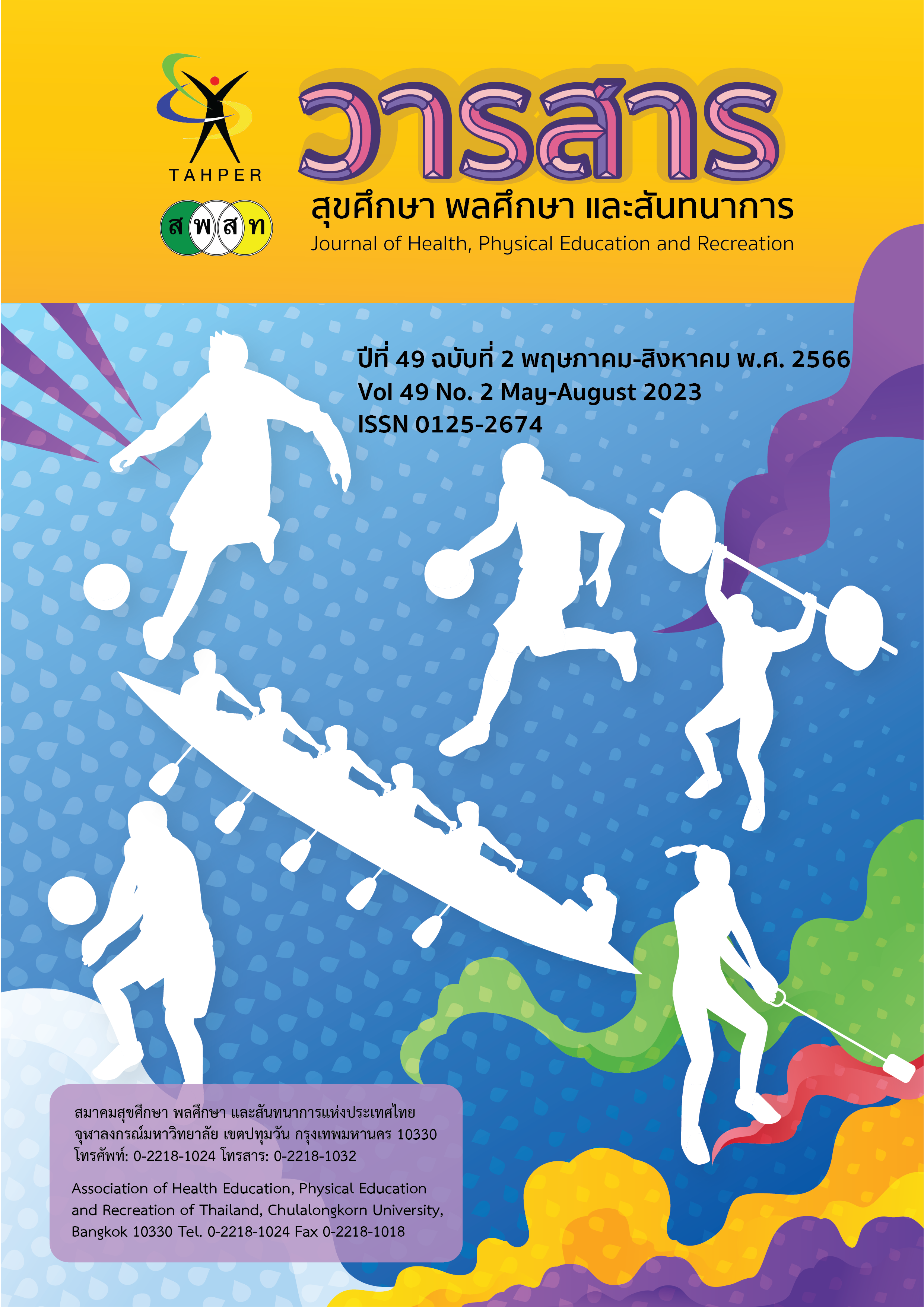Effects of Physical Education Learning Management Based on Kohlberg’s Theory on Moral Ethic and Basic Skills In Taekwondo of Eighth Grade Students
Main Article Content
Abstract
The purpose of this research was to 1) to compare the mean scores of moral ethic and basic skills in Taekwondo before and after the experiment of the experimental group students who were assigned the physical education learning management based on Kohlberg’s theory and the control group students who were learning Taekwondo as normal 2) to compare the mean scores of moral ethic and basic skills in Taekwondo after the experiment of the experimental group students who were assigned the physical education learning management based on Kohlberg’s theory and the control group students who were learning Taekwondo as normal. The sample was 68 eighth grade students from school affiliated with Office of the Basic Education Commission divided into 34 experimental group students and 34 control group students were be Simple Random Sampling. The research instruments were 8 lesson plan, 1 day a week, each has 60 minutes and composed of 8 physical education lesson plans based on Kohlberg’s theory with IOC of 0.89, the assessment form of moral ethic and quality level assessment criteria with IOC of 0.98 and 0.98 respectively, and the test of basic skills in Taekwondo and quality level assessment criteria with IOC 0.98 and 0.98 respectively. The data were analyzed by means, standard deviation and t-test. The results were as follows: 1) The mean scores of moral ethic and basic skills in Taekwondo of the experimental group students were
significantly higher than before the experiment at 0.5 level. 2) The mean scores of moral ethic and basic skills in Taekwondo after the experiment of the experimental group
students were significantly higher than the control group at 0.5 level. Conclusion: physical education learning management based on kohlberg’s theory on moral ethic and basic skills in taekwondo of eighth grade students can make the students have a better moral ethic and basic skills in taekwondo
Article Details

This work is licensed under a Creative Commons Attribution-NonCommercial-NoDerivatives 4.0 International License.
Critical thinking in journals is the right of the author. The Association of Health Education, Physical Education and Recreation of Thailand is not always required, to create diversity in ideas and creativity.
ความคิด ข้อวิพากษ์ในวารสารเป้นสิทธิของผู้เขียน สมาคมสุขศึกษา พลศึกษา และสันทนาการแห่งประเทศไทยไม่จำเป็นต้องเห็นชอบด้วยเสมอไป เพื่อให้เกิดความหลากหลายในความคิดและความสร้างสรรค์
References
ณัฐพร สุดดี และภารดี ศรีลัด. (2558). รายงานการวิจัยเรื่องสภาพและปัญหาการเตรียมทีมนักกีฬา ของโรงเรียนสาธิตที่สังกัดมหาวิทยาลัยของรัฐที่เข้าร่วมการแข่งขันกีฬาสาธิตสามัคคี ครั้งที่ 33. คณะครุศาสตร์ จุฬาลงกรณ์มหาวิทยาลัย.
ดวงเดือน พันธุมนาวิน. (2543). การพัฒนาจริยธรรม. กรุงเทพมหานคร: สถาบันวิจัยพฤติกรรมศาสตร์ มหาวิทยาลัยศรีนครินทรวิโรฒประสานมิตร.
ไพศาล ช่างจงประดิษฐ์. (2549). TAEKWONDO. กรุงเทพฯ: วี.ซี.พี. ซัคเซสกรุ๊ป หจก.
วรศักดิ์ เพียรชอบ. (2548). รวมบทความเกี่ยวกับปรัชญา หลักการ วิธีสอน และการวัดเพื่อประเมินผลทางพลศึกษา. กรุงเทพฯ: สำนักพิมพ์แห่งจุฬาลงกรณ์มหาวิทยาลัย.
วาสนา คุณาอภิสิทธิ์. (2539). การสอนพลศึกษา. กรุงเทพฯ: บริษัทพิมพ์ดี.
เศวตาภรณ์ ตั้งวันเจริญ. ทฤษฎีการเรียนรู้. 2558 สืบค้น 22 ตุลาคม 2562 จาก https://slideplayer.in.th/slide/16319737/
สำนักงานคณะกรรมการพัฒนาเศรษฐกิจและสังคมแห่งชาติ. (2559). เอกสารประกอบการระดมความคิดเห็นแผนพัฒนาเศรษฐกิจและสังคมแห่งชาติ ฉบับที่ 12 (พ.ศ. 2560-2564).
สุโชค ฉันทะนิ. (2560). ประสิทธิผลของการสอนแบบเพื่อนช่วยเพื่อนตามแนวเสริมต่อการเรียนรู้ที่มีต่อทักษะพื้นฐานการเตะในกีฬาเทควันโด. วิทยานิพนธ์ปริญญามหาบัณฑิต คณะวิทยาศาสตร์การออกกำลังกายและการกีฬา, มหาวิทยาลัยบูรพา.
อัญชิสา สุรีย์แสง. (2553). การใช้กิจกรรมพัฒนาความมีระเบียบวินัยในตนเองของนักเรียนช่วงชั้นที่ 3 โรงเรียนอรุณประดิษฐ์ จังหวัดเพชรบุรี. วิทยานิพนธ์ปริญญาศิลปศาสตร์มหาบัณฑิต. สาขาจิตวิทยาชุมชน, มหาวิทยาลัยศิลปกร.
อภิวัฒน์ งั่วลำหิน. (2553). การจัดการเรียนรู้พลศึกษาโดยใช้กิจกรรมกีฬาฟุตบอลตามแนวคิดพัฒนา
จริยธรรมของโคลเบิร์กเพื่อพัฒนาความมีน้ำใจนักกีฬาของนักเรียนประถมศึกษา. วิทยานิพนธ์ปริญญาครุศาสตรมหาบัณฑิต, สาขาวิชาหลักสูตรการสอนและเทคโนโลยีการศึกษา, จุฬาลงกรณ์มหาวิทยาลัย.


